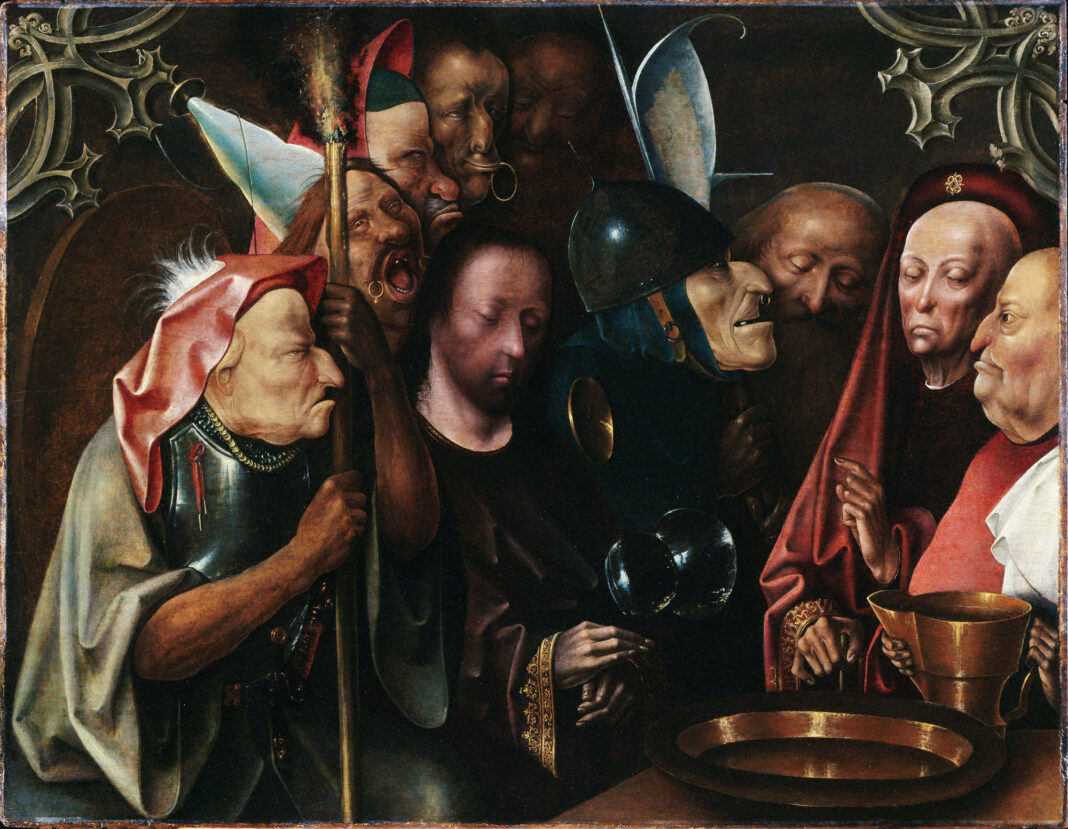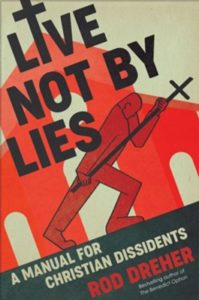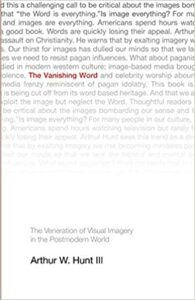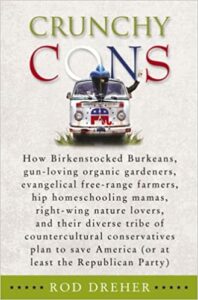Martin, TN. I was in the middle of Rod Dreher’s book, Live Not by Lies (2020), when I looked up and saw the U.S. Capitol being overrun by horned agitators, QAnon conspiracists, MAGA Civil War-ists, white supremacists, and Camp Auschwitz sympathizers. What I saw on January 6, 2021, caused me to pause and read the book from a slightly different perspective. Although Dreher addresses the dangers associated with the Woke Left, events surrounding the election made me wonder about the dangers associated with the Fringe Right.
This essay considers the demons on the Left as well as the Right. As the Republican Party attempts to reboot itself, it should return to something Dreher wrote fifteen years ago that the Front Porch Republic (and Front Porch Republicans) can rally behind.
Demons in Democracy
Dreher’s overriding theme in Live Not by Lies is that a spineless Christianity is not prepared to suffer for the truth; rather, it will relent when threatened to conform to the culture, especially if failure to conform means social ostracization or personal economic loss. Dreher calls his readers to be prepared to stand up for the truth no matter the cost.
For example, he recalls how the great Russian dissident, Aleksandr Solzhenitsyn, insisted that the man who refuses to live by lies will not “say, write, or distribute anything that distorts the truth” and “will not vote for a candidate or proposal he considers to be ‘dubious or unworthy.’”
Live Not by Lies is reminiscent of Ryszard Legutko’s The Demon in Democracy: Totalitarian Temptations in Free Societies (2016). Legutko, who grew up in Soviet-occupied Poland, became concerned when he recognized behaviors associated with communism were becoming prevalent in Western democracies. Legutko argues that the West’s persistence in throwing off its Christian heritage, its never-ending quest for radical egalitarianism, and its efforts at silencing dissent from traditionalists suggest a rising authoritarianism.
Dreher also notes these trends, but he places more emphasis on Woke Capitalism and surveillance technologies. While Legutko proposes classical republicanism as the best defense against totalitarian temptations, Dreher seems to be saying a form of soft totalitarianism is now all but inevitable. Therefore, Christians had better brace themselves. Essentially, Dreher reasserts his Benedict Option thesis as a way to prepare ourselves for the coming storm.
Both Dreher and Legutko find within the new soft totalitarianism elements of Orwell’s 1984 and Huxley’s Brave New World. Of course, Orwell gave us a picture of a tyranny with a sad face, echoing both Nazism and Stalinism, while Huxley gave us a picture of a tyranny with a happy face—of human hatcheries, soma, Orgy-porgy, and technology with a capital T.
Dreher shows how the quest for personal happiness, consumerism, and the new sexual ethic of LGBTQ is more Huxleyan than Orwellian. Likewise, Legutko’s claim that public discourse has been debased through democracy’s alliance with the entertainment industry is more Huxleyan than Orwellian.
The Origins of Totalitarianism
While both Dreher and Legutko underscore the radicalization of the Left in a Wokeward direction, neither author really carves out space regarding the radicalization of the Right, whether in Europe or America. In all fairness to Dreher, five days after the insurrection he posted this comment in his The American Conservative blog: “It is clear to me now that the United States is in much deeper trouble than I realized even a week ago. . . the depth of the ideological capture of the Right by a parallel insanity is becoming clearer to me.”
In the same post Dreher quotes from Live Not by Lies explaining the difference between “simple authoritarianism” (a dictatorship that monopolizes state power) and a totalitarianism where “an ideology seeks to displace all prior traditions and institutions under the control of an ideology.” The point Dreher seems to be making is that while Trump’s authoritarian tendencies should be loathed, the real danger for America lies in Woke-infused soft totalitarianism that has wrapped its tentacles around academia as well as the corporate world.
Crucial to Dreher’s thesis is Hannah Arendt’s The Origins of Totalitarianism (1951), which analyzes the rise of both Nazism and Stalinism. Arendt shows her readers how these two ideologies had more similarities than differences in the way they gained and maintained power. Arendt’s examination of how authoritarian regimes rise to power is highly pertinent to our own times.
Of course, Nazism was an ideology in its own right. The Party’s mythos included vengeance against all perceived enemies, a pure Teutonic race, and an ethos imagined in Wagner’s “Twilight of the Gods.” In the 1930s, Germany’s pagan past rose out of the chaotic mist—barbaric, self-determined, and violent—and took the land of Luther to the edge of the abyss. A super-race needed a Nietzschean Superman to realize its dream-vision; therefore, Hitler made himself a cult figure and grew his party through brute intimidation (the stick) and a sophisticated propaganda machine (the carrot).
We should not forget that the little corporal rose to power through the democratic process, receiving 37 percent of the vote in the German presidential election of 1932 (based on the strength of his support, he was then appointed Chancellor in 1933 by President Paul von Hindenburg). The Führer cult was best captured in the refrain of Rudolf Hess, who uttered at the start of each rally: “The Party is Hitler! Hitler is Germany, just as Germany is Hitler!” Once Chancellor, Hitler totalized his authority by seizing all the vestures of the state.
A professor once told me in graduate school that Hitler inoculated us against all other Hitlers. I did not believe this conventional wisdom then, and I do not believe it now. Francis Schaeffer warned us forty years ago in The Great Evangelical Disaster that once our biblical consensus and Christian ethos is removed, once all morality becomes relative, once law becomes arbitrary, society moves toward disintegration and a prevailing authoritarianism fills the vacuum. “At this point the words ‘right’ and ‘left’ will make little difference,” Schaeffer said. “They are only two roads to the same end.”
When one recalls Arendt’s observation that isolation and loneliness tend to breed authoritarianism, Schaeffer’s warning becomes even more acute. Add to this mix how social media and the COVID pandemic exacerbates human atomization and it is not hard to imagine how a dangerous soup might be cooking.
Pants on Fire
Gene Edward Veith, Jr., and I have both written how Germany’s bout with fascism can be viewed as a postmodern phenomenon with the prime tenets of irrationality and spectacle undergirding it. Nazism’s irrationality was to be found in its anti-intellectualism, its book burning, and its enshrinement of the Nazi Party as the sole arbitrator of truth. Nazism’s spirit of spectacle was to be found in its visual propaganda, its pathological rallies, and its theatrical leader who was able to work up audiences into a frenzy by ranting endlessly against the injustices of Versailles, the disease of the Jews, and the flaws of democracy.
In many regards, Trump is a postmodern political figure who embodies these elements of irrationality and spectacle. The fact that Trump was a TV reality show host before being elected to office is just part of the problem. His lawlessness and his aversion to the truth round out a tragic episode for constitutional democracy.
Although the Senate acquitted Trump in what is now his second impeachment trial, nothing will erase from memory the images of him standing over a mob with a clinched fist shouting, “Stop the steal.”
By all accounts the election was not stolen. Trump told a BIG FAT LIE. Again.
Former presidential speechwriter Peter Wehner, who served under three Republican presidents, told PBS Newshour anchor Judy Woodruff that Trump “lies morning, noon, and night . . . What you have got is a man in the White House who is engaged in not just an assault on truth, but an effort to annihilate truth.” Trump’s lying began with the crowd size of the 2017 inaugural and ended with his denial of the 2020 election results. In between these two events, it was, indeed, literally, morning, noon, and night—without ceasing.
And precisely here we should hold out Solzhenitsyn’s standard for truth-telling, as Dreher would call us to do. We should not live by lies and we should not celebrate people or ideologies that do—neither from the Left or Right.
The Way Forward
The Republican Party is now embroiled in a battle for its soul. Does the GOP really want for its poster child someone who wrote in a Facebook post that Jewish laser beams from outer space started forest fires in California and that the attack on the Twin Towers was a hoax? It is hard to imagine the Republican Party moving toward this kind of irrationality and spectacle, but it was also hard to imagine the sacking of the Senate chamber until it actually happened.
As to the possibility that an American brand of fascism could make itself known on these shores, Dreher is probably correct in saying there is a stronger danger from the Left than from the Right. However, if a significant number of Christians—a large segment of Trump’s old constituency—throw off their love for the Truth (what Schaeffer called “true truth”), embracing, as a good number of them seem to have done, a cult of personality or silly conspiracy stories that spin out from the social media echo chamber, then we must contemplate the prospect of authoritarianism on two fronts.
And who wins in a contest between Woke Soft Totalitarians and Fringe Right Conspiracists? Nobody. But there will be many losers, not least among them Christians who fail to stand for the truth.
Dreher proposed the best way forward for the Republican Party when he wrote Crunchy Cons. In case anyone has forgotten the manifesto, here it is again in brief:
- Conservatism should focus more on the character of society than on the material conditions of life found in consumerism.
- Big business deserves as much skepticism as big government.
- Culture is more important than politics and economics.
- A conservatism that does not practice restraint, humility, and good stewardship—especially of the natural world—is not fundamentally conservative.
- Small, local, old, and particular are almost always better than big, global, new, and abstract.
- Beauty is more important than efficiency.
- The relentlessness of media-driven pop culture deadens our senses to authentic truth, beauty, and wisdom.
- The institution most essential to conserve is the traditional family.
These are Front Porch Republic values and merit a fresh set of eyes from the GOP. Lies, melees, and laser beams will get the Party nowhere.
Image credit: Christ Before Pilate, follower of Hieronymous Bosch.














One could argue that it was the American right’s ignoring/rejecting of Crunchy Cons and other books of that stripe that helped lead it to the predicament that it’s in today. I remember trying to get conservative friends to read it and talk about it, but hardly any of them bothered, and the ones that did simply nitpicked it to death. Fifteen years ago conservatism was given a little bit of a chance to change its direction somewhat, but it failed to do so.
I’m glad to see so many people taking up the “live not by lies” mantra from Dreher’s latest book. Dreher gets it from Solzhenitsyn who studied modern totalitarianism and correctly diagnosed the heart of the trouble. It’s the ancient answer to political corruption. Socrates discussed in fine-grained analyses which he hoped might save Athens from corrupt politicians with great power. We can know the truth by way of human reason, though the path can become arduous.
“Live not by lies” is not a simple answer. We can fix much of ails us by adhering to the truth, but to speak the truth we must first learn the truth, and the great Satanic plan relies on deception to render humanity unable to discern good from evil.
Note Mr. Hunt makes this point central to his argument: “By all accounts the election was not stolen.” Really? It’s certainly true that this view has been trumpeted widely throughout the media by key figures on both the left and the right. And it’s true that many “right-thinking” participants in public discourse from the right have felt obliged to repeat it by way of showing their “middle roadism” which has emerged as the favored path by many who want peace.
I’m pretty skeptical of finding such a middle way. We can’t really make peace between truth and lies by splitting the difference, although sometimes such a compromise may be politically expedient.
Isn’t it a lie to claim that we know the election wasn’t stolen? ALL accounts? What about the careful observers who have noted that 100 million votes were cast by mail in votes (which are banned in most orderly democracies because experience has taught it makes fraud so easy) and that this huge shift in voting practices was rammed through state governments in clear violation of state laws and the constitution, and that multiple analyses have found that the rejection rate for invalid ballots in the 2020 election was only a fraction of what it has been in the past.
I think the truth is that we do not know what the true vote was and that recounting ballots or auditing computers cannot reveal the truth, since once an invalid ballot is accepted and tossed into the pile most evidence that it is bogus has been destroyed.
Saying we know the election was not stolen is a big lie. Saying that we know the true vote is buying into the lie.
I think Trump acted badly on January 6. Saying that leading democrats have often acted worse (which is true) doesn’t really fix that. But claiming that he doesn’t believe the election was stolen and that therefore he was making a Big Lie goes beyond what we do know. The guilty are those made it impossible to know the actual vote.
The election was NOT stolen. Trump filed sixty lawsuits and lost all of them. No judge found any evidence of fraud or any evidence that indicated further proceedings would find fraud. The lawsuits filed by actual respected attorneys never claimed they had evidence of fraud, because lawyers who lie to judges get disbarred.
You are more than halfway to totalitarianism if you believe that Trump won the election or even that he didn’t lose as badly as the official vote records show. Why are you willing to sell your soul for a repulsive carnival barker like Donald Trump?
The election was stolen via obfuscation of legitimate votes through radical changes in mail-in voting, which were instituted unilaterally (read: undemocratically) by executives and election board officials in several key swing states.
The fact that the lawsuits did not find “fraud” sidesteps the assertion that the fraud in question was executed in a totally “legal” and very savvy way under the guise of COVID-19.
That’s certainly an opinion… just not a good one. Other countries like the UK, Poland, Switzerland, Iceland, and Spain to name a few use mail in voting or are using it for the pandemic. No one has been able to point to any massive fraud, especially none that would change the outcome of an election. Mail in voting has had its issues and it may not continue on past the pandemic in some countries but there is no reason to believe massive fraud has occurred in this election in America outside of the desperate need to hang on to a comforting lie. Legally speaking some of these changes you refer to were brought in court before the election, some of these challenges went before conservative judges, and they all lost. Others went unchallenged as they were not considered a big enough issue until one side lost and decided to throw a what amounted to a constitutional temper tantrum. You may point to certain incidents of mail in voter fraud (France decades ago for instance) but the situation today is not the situation of yesterday and the ability to verify votes quickly and accurately today is substantially greater then it was forty years ago. Id also note all types of voting in the past have been subject to fraud, organized or individual. Like it or not (you wont like it) you are more likely to see more of this than less. But what better way to “steal” the election to get more of the “wrong” people voting eh?
As an independent who finds both parties equally repulsive (but for different reasons) it seems quite clear to me that there was considerable chicanery going on on both sides. It may not all have been illegal, but much of it was certainly what Gollum called “tricksy.” It had the character of the tuna companies reducing the amount of tuna in the cans whilst keeping the cans themselves the same size.
The Trump side inevitably sees this as an attempt to steal the election, while the Biden side inevitably paints it as a move to prevent Trump from stealing the election. Even Time portrayed this as something of a “conspiracy”:
https://time.com/5936036/secret-2020-election-campaign/
As an observer with no skin in the game I think that both you and ‘Martin E.’ are partially right. It doesn’t matter much to be who is “more” right. I have not voted in a presidential election since 2008. This sorry-ass election, with evident bad juju occurring on both sides, has made me trust our current system less than before, not more. And I do not think things will improve by 2024.
There is no doubt in my mind that had Trump won the loonies on the left would have been doing very similar things to those which the loonies on the right have done. We may not have seen a storming of the Capitol, but I think we would have definitely seen a repeat of the Summer of 2020, and probably in worse form.
In short, this was not a “stolen election,” but neither was it “the saving of democracy!” There’s no doubt in my mind that skids were greased in Biden’s favor, but it was done in a manner in which the anti-Trump forces can claim plausible deniability, at least as far as illegality goes. Had Trump won, similar doubts would absolutely apply. It was a fiasco top-to-bottom, but perhaps the exact type of fiasco that only those without partisan commitments can recognize as one.
“You are more than halfway to totalitarianism if you believe that Trump won the election or even that he didn’t lose as badly as the official vote records show.”
Please. Numerous people have admitted to smelling a rat while being willing to live with the results and move on. In what universe is doubting the official records “halfway to totalitarianism?” You’d be a fool to trust the government to that degree. In fact, I’d argue that blind trust in the state leans more toward totalitarianism than having doubts about election returns.
I don’t think Trump is a liar. Harry Frankfurt, in his wonderful little book _On Bullshit_, points out that a liar knows he is lying, because he still (sort of) knows what the truth is and knows that he is not telling it. Trump is a bullshitter, which, Frankfurt concludes, is much more destructive since a bullshitter doesn’t care about the truth at all.
We should live not by lies, but even more importantly, we should live not by bullshit.
An excellent addition to the mantras we should be repeating.
Arthur, don’t know if you’re aware of it, but I just saw a day or two ago that Legutko has a new book out, The Cunning of Freedom.
“…the real danger for America lies in Woke-infused soft totalitarianism that has wrapped its tentacles around academia as well as the corporate world.”
What exactly is the “danger” or actual “totalitarianism” of that cultural whimsy which you label “Woke”? It’s rather amazing that you fulminate so about a phenomenon that is largely an academic and/or media fad. Meanwhile, the moral collapse of the right led not only to the Jan. 6th attack but also to Republicans blatantly trying to make it harder to vote in a slew of states across the map, and that’s happening right now. What concrete effect, if any, can you cite of the supposed “danger” and “totalitarianism” of “Woke” that would in any way compare to just those two examples of many?
Comments are closed.